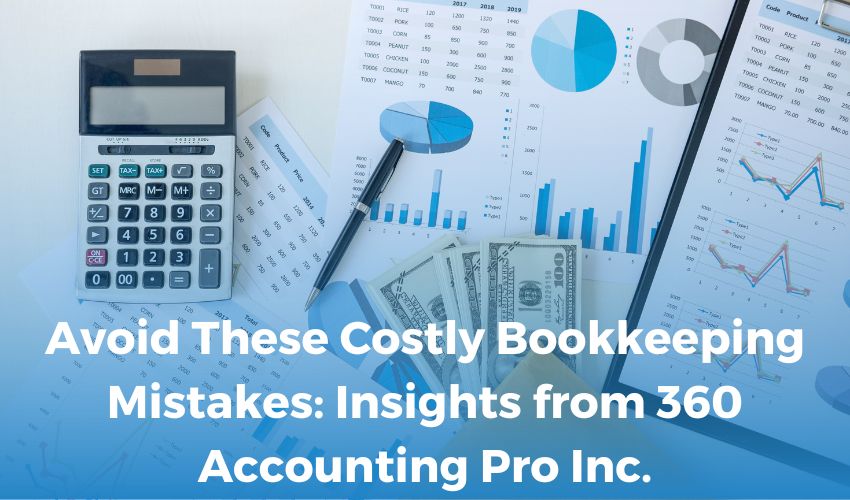

22-09-23
In business finance, bookkeeping is the foundation for accurate financial records. Proper bookkeeping helps you maintain a clear picture of your company's financial health, ensures compliance with tax regulations, and provides insights for informed decision-making. However, even the smallest oversight can lead to significant repercussions. In this comprehensive guide, brought to you by the financial experts at 360 Accounting Pro Inc., Let’s delve into the common bookkeeping mistakes that could cost you dearly and how to avoid them.
Neglecting Regular Reconciliation
One of the most fundamental bookkeeping mistakes is Reconciliation Services in USA your financial records regularly. Neglecting this essential task can lead to discrepancies between your records and actual bank statements, making it difficult to track expenses, identify fraudulent activities, or make accurate financial projections. To avoid this pitfall:
Set a Schedule: Make it a habit to reconcile your accounts regularly, preferably monthly. This ensures that you catch any discrepancies early and can address them promptly.
Use Reconciliation Tools: Accounting software often provides reconciliation tools that streamline the process. These tools can automatically match your transactions to bank statements, making the task more efficient and accurate.
Mixing Personal and Business Expenses
Blurring the lines between personal and business expenses is a recipe for confusion and potential tax issues. Treating your business account as an extension of your finances can lead to inaccurate financial reporting and even trigger IRS audits. Here's how to maintain separation:
Dedicated Business Account: Open a separate bank account for your business transactions. This makes it easier to track and categorize business expenses.
Consistent Record-Keeping: Ensure that every business expense is recorded accurately and that personal transactions remain separate.
Incomplete Record-Keeping
Only complete or consistent record-keeping can be a nightmare come sales tax season. With a comprehensive record of your financial transactions, you can avoid missing out on deductions, overpaying taxes, or facing penalties. To keep your records in tip-top shape:
Capture All Transactions: Record every financial transaction, no matter how small. Use accounting software or manual entry methods to ensure nothing falls through the cracks.
Organize Receipts: As mentioned in a previous blog, keeping receipts organized is essential. Ensure you save all relevant tickets and properly categorize them for easy reference.
Misclassifying Expenses
Misclassifying expenses can have a domino effect on your financial statements and decision-making. It can skew your profit and loss statements, misrepresent your financial health, and even impact your tax liability. To avoid this misstep:
Follow Standard Categories: Utilize established expense categories in your accounting software or create a consistent system for categorizing expenses. This ensures accurate financial reporting and easy identification of spending patterns.
Regularly Review and Adjust: Set aside time periodically to review your expense categories. Business operations evolve, and so do expense patterns. Adjust your classes as needed to reflect your spending accurately.
Forgetting to Backup Data
In the digital age, data loss can occur at any moment. You need to back up your financial data to avoid losing crucial information that could be catastrophic for your business. Safeguard your data by:
Automate Backups: Use cloud-based accounting software that automatically backs your data to secure servers. This provides a safety net in case of hardware failure or other unforeseen issues.
Regular Manual Backups: In addition to automated backups, periodically create manual data backups on external storage devices. Store these backups in a secure location.
Ignoring Tax Deadlines and Obligations
Tax compliance is a cornerstone of responsible bookkeeping. Missing tax deadlines or failing to meet your tax obligations can result in penalties, interest, and legal issues. Keep your tax matters in order by:
Marking Important Dates: Maintain a calendar that highlights important tax deadlines. This includes filing dates for income tax returns, payroll taxes, and other applicable taxes.
Consult Professionals: Enlist the assistance of a qualified tax professional to ensure you're aware of all your tax obligations and deadlines. They can help you strategize to minimize tax liabilities legally.
Overlooking Employee Records
If you have employees, proper record-keeping becomes even more critical. Failing to maintain accurate records of employee wages, benefits, and tax withholdings can lead to payroll errors, legal disputes, and compliance issues. To avoid this:
Implement Payroll Systems: Utilize reliable payroll software that automates calculations and deductions. This reduces the likelihood of errors and ensures accurate employee compensation.
Keep Employee Files Organized: Maintain organized records for each employee, including contracts, tax forms, and benefits information. This helps you address employee inquiries and stay compliant.
Avoiding these costly bookkeeping mistakes is essential for maintaining a healthy financial foundation for your business. By adopting disciplined practices, utilizing reliable accounting software, and seeking professional guidance when needed, you can confidently navigate the complexities of bookkeeping. Remember, investing time and effort into accurate and consistent bookkeeping now will save you from the headaches and financial setbacks that these mistakes could cause down the road. Trust the insights from 360 Accounting Pro Inc. and take charge of your bookkeeping practices to secure a prosperous future for your business.
Read more: Avoid These Top Accounting Mistakes to Ensure Smooth Tax and Payroll Processes
Tags :













































.jpg)
.jpg)
.jpg)
.jpg)


).jpg)














 Get A Quote
Get A Quote
Leave A Comment